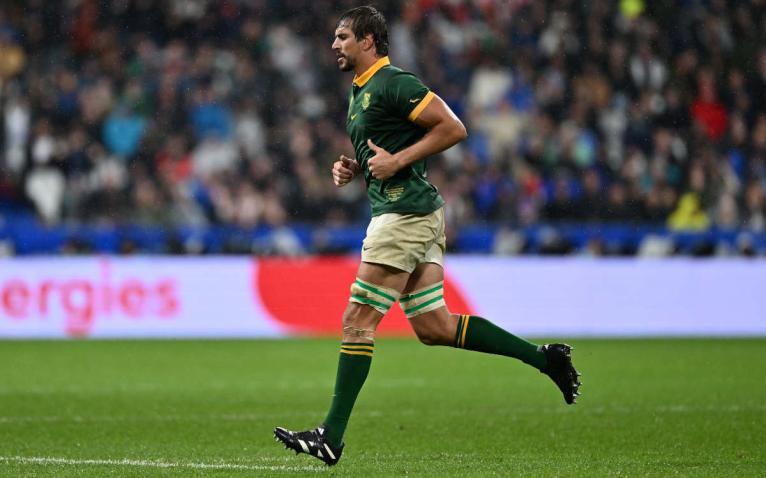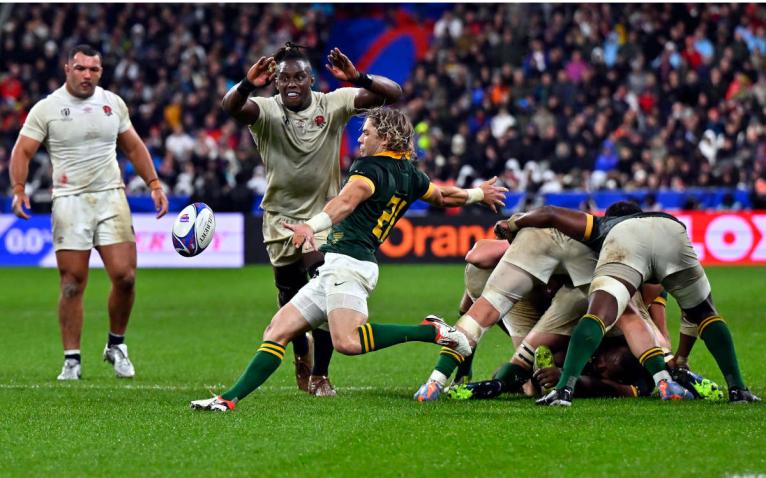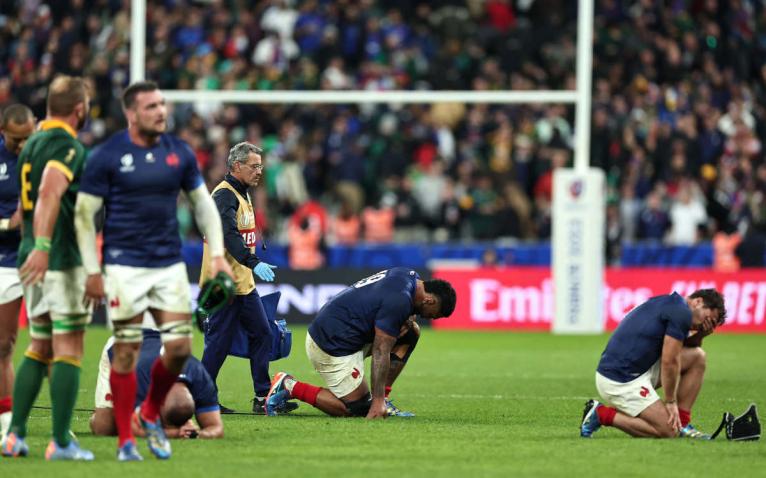Imagine you’re Manie Libbok. Ever since your Test debut less than a year ago you’ve been simultaneously heralded as the most exciting fly-half in Springboks history and a superfluous showpony who only got his chance because of an injury to the incumbent. There have been some blockbuster moments. Only a few weeks ago you pulled off a no-look cross-field kick try-assist. But now, under the driving rain in Paris, you’re having a shocker in the most important match of your life.
Imagine you’re Eben Etzebeth. You’re playing your 118th Test for your country as the most experienced man on the pitch. Ever since your debut 12 years ago you’ve been a totem of Springboks rugby. You’re already a contender for the greatest ever Bok but now, under the driving rain in Paris, you’re having a shocker in what is almost certainly your worst performance of your career.
One of sport’s joys is found in the misery it inflicts on even the most accomplished practitioners. Giants are felled not only by opponents but by the crushing weight of expectation. This isn’t merely schadenfreude, although there is certainly a degree of it at play. This is about the games we love and their propensity to humble even the mightiest heroes. And in a World Cup semi-final, two men were humbled on the grandest stage.

Libbok was hooked after just half an hour, an almost unspeakably early switch for any player, let alone a young fly-half tasked with running the show. Etzebeth saw out the first half but lasted just six minutes of the second. He was the player of the match against France in the quarterfinals and the scorer of a late barnstorming try in an epic encounter. He wasn’t the only member of South Africa’s tight five that was bossed and bullied by those in white, but given his own staggering standards, it felt like an ignominious substitution.
After the match, which South Africa won in a manner that left millions of fingernails chewed to bloody nubs, Jacques Nienaber explained away the decision with some standard coach-speak.
“The beauty of this group is that we’re open and honest,” Nienaber said, no doubt chuffed that all his replacements made a difference, not least the props Ox Nche and Vincent Koch, who won a series of scrum penalties that helped turn the tide against the English. “Because we have the right players, the players accept it.”
No matter the sport, keeping talented players content on the bench is a crucial task for any coach. Without a watertight message that everyone has a role to play, and that one poor performance won’t count against them, the whole operation can come unstuck by a sulking prima donna
In most cases this would sound like little more than guff intended to salve the wounds of proud athletes. But in the case of the Springboks, it’s true. Nienaber pointed out that in 2018 Mbonambi was replaced after 35 minutes in a crunch Test and then started the next week. It is a rock solid sense of togetherness, a steadfast sense of mission, that has engirded this buy-in. Forget the marketing slogans and the trademark ‘Bomb Squad’, what really makes this Springboks side such a dangerous prospect throughout the 80 minutes of a match is that every player genuinely feels that he is part of something that matters.
Of course it helps when those players are world class operators. Handre Pollard and RG Snyman, scorers of the points that rescued the game against England, are World Cup winners. Depth has been a strength of South Africa’s throughout the Nienaber-Rassie Erasmus era but the way that depth has been managed needs praise.
No matter the sport, keeping talented players content on the bench is a crucial task for any coach. Without a watertight message that everyone has a role to play, and that one poor performance won’t count against them, the whole operation can come unstuck by a sulking prima donna on the side.

It is from this culture that Nienaber and Erasmus were able to act so decisively. Maybe without it they’d have been reluctant to make the requisite changes that all impacted on the match. Faf de Klerk’s more accurate box kicks were an improvement on what Cobus Reinach put up. Kwagga Smith brought extra zip to the back row and around the breakdown. Deon Fourie was more direct and it was his peel off the back of a maul that gave the go-forward before Snyman’s try. Empowerment is not just a buzzword spouted by consulting firms. When it’s put into practice and folded into a disciplined, dextrous and skilful team, special things can take place.
Perhaps this explains why the Springboks refuse to accept when they’re beaten. Perhaps this is why they’ve scraped their way to another World Cup final after being second best in the two previous knockout matches.
England executed their strategy to perfection in what was a clear coaching masterclass from the former Leicester Tigers boss. And yet they lost.
France dominated every statistic in the quarter-final. Fabien Galthie’s team had almost a third of the territory and possession, they were quicker at the ruck and beat almost four times as many defenders. And yet they lost.
Steve Borthwick’s England set out to play a very different game to France as they dragged South Africa to the gutter. Even so, they executed their strategy to perfection in what was a clear coaching masterclass from the former Leicester Tigers boss. And yet they lost.
Just over 2,000 years ago, Quintus Ennius, sometimes dubbed the father of Roman poetry, offered a line that is still relevant today. “The victor is not victorious if the vanquished does not consider himself so”. He was talking about the Roman Empire’s staying power. How even after catastrophic losses in particular battles, fresh and motivated legionaries would ultimately win the war. The comparisons are obvious.

For the encirclement at the Battle of Cannae against Hannibal’s Carthaginians we have Jonathan Danty storming through the breach and Antoine Dupont’s fizzing passes. For the swinging Germanic axes at the Battle of Arausio we have Owen Farrell’s swinging right boot as he landed a drop-goal to open a nine points gap. Most empires would have crumbled after such crushing defeats just as most rugby teams would have crumbled after such crushing moments. History shows the Romans were built differently. Like it or not, so are the Springboks.



Brilliant article!!
Sjoe. That took my breath away.
What I have enjoyed about the boks strategy for this World Cup, is the way they managed their 33 places.
They didn’t pick 4 scrumhalves. They picked 1 scrum half, a scrum half who can play 10 and two scrumhalves who can play on the wing.
They didn’t take a specialist hooker along - who wouldn’t really have been needed. It’s difficult to manage game time when you have three of. So rather have loosies who can play 2 and give them a run. It’s like having an extra Toyota engine in the shed.
Players have been circulated around in and out of positions. For the sake of giving them minutes. And train in a second role on the field. I think that’s cool.
Libbok was given a clear run in the pools by leaving pollard at home. Along with the temptation to pick Mr safe bet and not expose Libbok to the international scene. He stood up and delivered. And helped get the boks to the final. He leaves with a medal and invaluable experience.
The player management has been very clever.
lights candle under shrine of Rassie Erasmus. sings a hymn with a tambourine
You right, that's a kant story 🙄
Excellent article. Brilliantly written. Just a pity that more than half your target audience needs an interpreter since you made it clear that you swallowed a dictionary. Other than that, I'm on your kant, bru.
Decided not to watch Rugby Final as protest against racism as World Rugby refused to properly invest racism allegation made by Tom Curry
I don’t think people across the world understand South Africans. We are fighters, weather its online, on or off pitch. We fiercely patriotic. We defend our own. By belittling any South African you belittling a whole nation. And if you think about it its actually a very heartwarming thing if you take our history into account. Black, White, Coloured ( and no coloured is not a racial slur in SA ) and last but not least our Indian brothers and sister in Durban with the best curry in the world. Anyway back to my point. We might be combative but we can be just as nice and Welcoming. At the end of the day with a South African you get what you give, you nice to us and we will be nice to you, you respect us we will respect you. But game day come for that 80 minutes you will be our No.1 enemy.
Last but not least kudos to the author of this article, was a breath of fresh air for a change
Good assessment of the culture of the team. Imagine the ego of one player standing in the way of making a decision that’s good for the team and the result. Manie has grown more than he probably ever expected from this World Cup.
The Roman empire survived many defeats but eventually fell under its own weight. Lets see if these Springboks can avoid falling at the final hurdle.
Nice read thanks, can't you help Ben Smith one of your colleagues to write something decent like you?
Excellent article.
The Springboks don't waste time and effort.All that is needed to beat your opponents is one point difference.
They will beat NZL 20 - 19™️
🤗